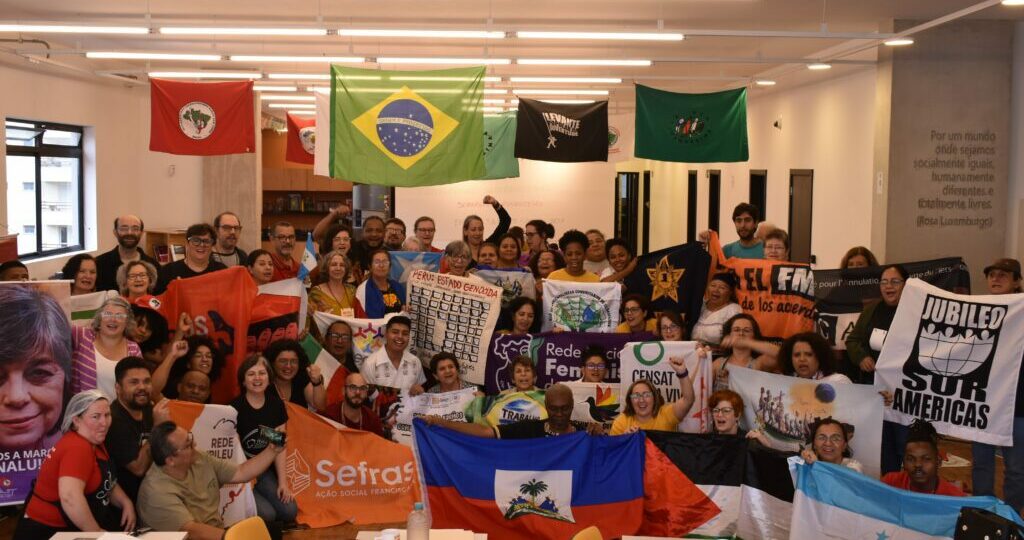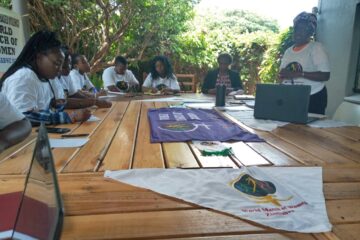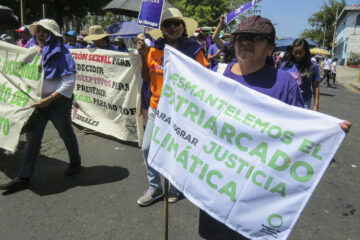For at least 50 years, capitalist accumulation has been ruled by economic and political neoliberalism in Latin America. Throughout this period, nation-states went through profound reforms and, under the rhetoric of “modernity,” paved the way for the pillars that have structured financialization.
Countries and their peoples have progressively lost their ability to manage their own economies, have financial sovereignty over their currencies, define their national budgets, and take part in the decision-making processes regarding them. Structural adjustment policies imposed since the 1980s have made states become, more and more, excellent financial debt payers, to the detriment of paying social and historical debts with their impoverished populations.
Getting back the power to decide over the countries’ financial sovereignty is a conversation that goes beyond a central bank or a ministry of finance or economy: it’s about the people getting back the power to decide over where to apply public resources and define budget priorities. These were the elements that marked the Financial Sovereignty Conference held by Jubilee South Americas in partnership with CEAAL [Popular Education Council for Latin America and the Caribbean] and CADTM [Committee for the Abolition of Illegitimate Debt], attended by representatives of 20 Latin American and Caribbean countries.
Since the great industrial revolutions of the 18th century, capitalism has been a living body that is constantly changing and adapting — going through metamorphosis— with the only purpose of ensuring greater surplus than it had when it first started, ejecting the hindrances for the creation of surplus value. Capital, whether in the form of money or commodity, constant, industrial, or fictitious capital, modifies itself aiming to increase its value. Surplus value is the order—as Rosa Marques and Paulo Nakatani remind us, “the movement of capital must be understood as a kind of spirit, or a ghost, that shifts from one form to the other, and, in this movement, capital subjects people, things, and society at larget to its desires or its logic, as if it were a phantasmagorical spirit with a mind of its own.”
The public debt system has played a fundamental role in the genesis of this movement, from the primitive accumulation of capital to the constitution of fictitious capital. This is the primary core of a market of public and private bonds that has established itself as one of the mechanisms to control social ownership under capitalism. Debt systems today ensure the reproduction of capital and ensure the maintenance of profit rate drops. This system feeds dependency, and it is an obstacle for countries to reach financial sovereignty.
Financial dominance is characterized by the centrality of financial capital in ruling relations of reproduction, and it expresses the global neoliberal escalation of the 1990s. This logic imposes onto economic policies the modus operandi according to which austerity is the “effective key,” used to justify social cuts. In Brazil, this has happened with the pension and labor reforms, which were attacks against social security. These are forms capital finds to keep gaining profits to the detriment of the right of the peoples to make decisions. This right is captured and put under the aegis of financialization.
Among many conditioning factors, the current model of accumulation under the aegis of finance has been requiring more and more appropriation of public resources in the form of dividends. In the Brazilian case, the public debt system has been transferring—or rather “draining”—the public resources of the many to the pockets of a few rentiers, as argued by Professor Dowbor. This is a transfer that has no cost to rentiers—only profits. The distribution of profits and dividends used to be imposed a 15-percent tax fee until 1994, but has been tax-exempt ever since.
Profits and dividends refer to gains—almost exclusively earned by the richest 1% of society. Debt is the no-limit credit card of the rich.
Over the course of the last three decades, it is estimated that around 5 percent of the Brazilian GDP has been transferred to the rich who are creditors of state debt, which is 1.6 time the GDP accumulated since the 1990s. As Marques and Nakatani point out, “while the world’s expansion of financial assets remains strong, it has recorded a particularly dramatic increase in the 1990s. In 2000, its stock was 111.8-percent higher than in 1990; in 2010, it had grown 91.7-percent over 2000; and in 2014, it had increased 42-percent over 2010.”
Financial and social debts are the result of a past of extortion, exploitation, and anihilation of Indigenous people, Black people, women, and other groups that suffer the impacts of a mode of production that executes necropolitics—that is, the elimination of lives that are disposable to capital. Under this system, no people will reach their financial sovereignty, because they will remain dependent.
Financial, ecological, and food subordination is imposed through a way of doing politics aiming at meeting the needs of the market.
Competitiveness imposed by the technology race rules the changes in the technological fabric and leads to continuous scale gains. In the same sense, there are the assets in the carbon market, green bonds that emerge as a solution, but are nothing more than a way to financialize life, nature, and the climate. They do not generate sovereignty or care for life.
Systemic crises sparked by the climate collapse, incrasing social inequalities, and income concentration become deeper and deeper. Capitalism—unlike what its advocates argue—has not proved to be a selfless mode of production. The “moral sentiments” nurtured in the early days of the market only offer social and economic insecurity, leaving most new generations unable to dream.
Even amid so many tragedies, the hegemony of capital and its preponderant power can be explained through objective and subjective elements that go beyond this reflection. The guidelines of the concept of hegemony formulated by Antonio Gramsci offer a contribution for us to understand the current juncture. Hegemony is obtained in battles that include not only issues connected to the economic structure and political organization, but also include, on the ethical-cultural realm, the expression of knowledge and practies, modes of representation, and models of authority that aim to legitimize and universalize themselves. Hegemony, therefore, cannot be understood in the limits of simple coercion, because it includes the cultural direction of and the social consent to a universe of convictions, moral norms, and rules of conduct, as well as the destruction and overcoming of other beliefs and sentiments in face of life and the world.
The constitution of hegemony is a historically long process, which occupies many different spaces, and their forms vary according to the social actors involved. Finally, hegemony is expressed by a class that leads the constitution of a historical bloc, which brings together different social groups and makes them cohesive around the creation of a collective will—defined by the “working consciousness of historical necessity.”
Pathways Toward Financial Sovereignty
Unlike the current financial supremacy and hegemony, financial sovereignty is based on the solidarity, identity, and creativity of Indigenous people, Quilombola people; the leadership and strength of women in their territories, ensuring grassroots participation, and attesting other decision-making spaces that ensure grassroots participation.
Financial sovereignty is in the struggle of the Awá Guarani people for the acknowledgement of their territory in Foz do Iguaçu (Itaipu Power Plant), in the solidarity with the struggle against the militarization endured for decades by the Haitian people, in the solidarity with the Palestinian people, brutally massacred, in the resistance against the imposition of a variety of fiscal austerity measures by international agencies.
Financial sovereignty is intrinsically connected to the sovereignty of the peoples, food sovereignty, water sovereignty, and territory sovereignty. As mentioned in the conference’s declaration: “We need to decolonize power and build counter-power, from the bottom up, from the peoples and territories, deep-rooted in the respect for each territory’s historical processes, memory, ancestrality, and political work, as well as build and position a counter-hegemonic narrative based on reciprocity, complementarity, collectivity, and awareness of being nature.”
The strengthening of concrete counter-hegemonic alternatives, forged in grassroots culture and the creativity of the peoples, animates the possibility a different form of organizing life. We will move forward in building peoples’ sovereignty and empowering grassroots organizations that carry in their bodies the cultural melting pot of the Good-Living paradigm and the ancestral immanence of Abya Ayala.
___
Rosilene Wansetto, Sandra Quintela, and Talita Guimarães are members of the Jubilee South Brazil Network.




